
The Secret of Monkey Island: Special Edition
Written by: Rik
Date posted: August 15, 2020
- Genre: Adventure
- Developed by: LucasArts
- Published by: LucasArts
- Year released: 2009
- Our score: 8
Arguments about the merits, or otherwise, of remakes, remasters and the like are fairly well-worn. And while it’s not an issue about which I can become particularly exercised, for what it’s worth, I think I’m mainly of the school of thought that games are of their time, and any notion of providing a ‘modern’ update is inherently flawed. The update then becomes of its time and at a later stage the prevailing opinion may be that it either requires a further update of its own, or that the original was perfectly fine as it was and has in fact aged more gracefully than the newer version. On the other hand, I prefer the VGA re-release of The Secret of Monkey Island to the EGA original, so perhaps I don’t really know what I’m talking about.
Remastered versions of some LucasArts adventures have started to appear via Tim Schafer’s Double Fine Productions over the past five years or so, although this pre-dates all of them and is pitched specifically as an updated ‘Special Edition’ which goes beyond a mere sharpening of the same basic game, introducing all-new graphics, and adding voice acting where there previously was none. As the Special Edition was (and remains, at the time of writing) the only commercially available version of The Secret of Monkey Island, we (by which I mean I) blithely added a note about it to the bottom of this site’s review of the original a couple of years after it was released and thought little more of it. Until now, when it turned out that I wanted to play the game again, and dipped into the GOG library to confirm that I had indeed bought it some time ago with such an occasion in mind. (For at least some of the many, many games that I acquire with the intention of covering them for the site ‘one day’, that day does eventually come).
So, here we are, playing and reviewing Monkey Island again, after a brief internal debate of our own about re-hashing old content and the value of re-reviewing an update of a game we’ve already covered (short answer: it’s fine). Because this is, in almost every fundamental respect, the same game: you can, if you so choose, turn off all of the new bells and whistles, and simply choose to play through the unburnished VGA version that we reviewed previously. So we’ll focus mainly on those aforementioned bells and whistles, although I haven’t actually played Monkey Island since 2005, and so some reflections on the game itself will also be offered. As we all know, reviewing games is a highly precise and scientific business, so lest you concern yourself with the discrepancies between the two reviews, rest assured that the FFG Review-Tron 3000™ has been specifically calibrated to account for each and every one of them. Ok?
In summary, what’s new here is some all new artwork, an updated interface, and full voice overs for all characters, with Dominic Armato, who undertook duties for games 3 (Curse of Monkey Island) and 4 (Escape from Monkey Island) plus Telltale’s Tales of Monkey Island, returning as Guybrush. The graphics are sharp and not without a certain charm of their own, although it’s also fairly disconcerting to see something so familiar transformed in such a fashion. And, as with anything that boasts a significant fan following, one doesn’t have to search far for negative feedback on this aspect of the Special Edition, with Guybrush’s haircut a particular target of strong feeling.
As someone who played the EGA and VGA versions at the time, with eyes used to 90s visuals, I’m hardly impartial, but I’d possibly go back to what I said about remakes dating themselves to a certain point in time. In 2009, the indie scene was pretty active, but maybe hadn’t quite permeated into the mainstream to the extent it has now, and maintaining the original pixelly graphics as a deliberate choice was probably never on the cards. But these days, even if those original visuals always were considered perfectly fine as they were to some, that opinion would probably be shared by a wider range of gamers. Or, to take an example from a previous attempt to ‘update’ the series, to say that The Secret of Monkey Island looks better than Escape from Monkey Island is hardly the claim of a deluded retro maniac (in fact, you’d be viewed with more suspicion if you claimed it was the other way around). Anyway, I don’t have a particular problem with the updated visuals, although the combination of sharper characters and what look like the original animations is an uneasy one. This could be to do with the fact that you can switch between the new graphics and VGA on the fly by pressing F10, although when the latter also turns the voice acting off.
Speaking of which, sound is a mixed bag, too. I always liked Armato as Guybrush, while other significant players, including Alexandra Boyd as Elaine and and Earl Boen (The Terminator‘s Dr Silberman!) as LeChuck also return from earlier games. Overall, I found the experience a bit uneven: perhaps it’s just the strangeness of having lines that you’re so used to reading being acted out in a different way from how you’d imagined, or that the character’s voices aren’t quite what you’d expected. Stan, the used boat salesman, was one that stuck out to me as not quite right (even though apparently the same actor from The Curse of Monkey Island returns here), while Governor Elaine’s sarcasm was somehow more effective in text form. Some of the minor characters also seem a level below, and I was certainly not a fan of the narrator, whose zany tones belong in a Sierra ‘comedy’ like Space Quest or Leisure Suit Larry. Again, it could be also argued that some of the magic of the original music has been lost, although some of the tunes are so memorable, it’s pretty hard to mess them up.
The interface has moved from the full SCUMM list of commands being visible throughout, to a more simplified one which allows the in-game graphics to fill the screen. Here, hovering over an object allows you to select a ‘default’ action with a right click (e.g a closed door will default to ‘open’), although for the game to actually work, the full list is of course needed, so you can bring these up by pressing Ctrl or by using a direct keyboard shortcut (e.g. press ‘T’ for Talk to), while Alt brings up the inventory. It can all get a bit fiddly, and by necessity it certainly feels like a hybrid workaround system, but it works well enough once you get used to it.
Which leaves us with the game itself. And whatever else you might say about the Special Edition, the inclusion of updated graphics and voice acting removes any clue that this is an old game, which shows you how well it stands up. Now, as a long-standing fan of the original, it’s hard to rule out fond memories and familiarity as a factor, but on the other hand, as previously mentioned it’s been 15 years since I last played (retro-heresy!): long enough to forget some if not all of the funny lines and be surprised and amused by them again, and to remember roughly what some of the puzzles are and what you need to do, but not have committed the solutions to memory.
The mixture of storytelling, humour and puzzles is expertly balanced, letting you know what you need to do next while allowing you room to explore, particularly as you start out on Mêlée Island™. Some of the puzzles are challenging, and harder than I remembered. Even those familiar ones, that I thought I knew, such as the famous insult sword fighting sequences, had a bit more to them than I thought. (And did I consult my own walkthrough when buying a boat without any money? Perhaps. Although it might have been better to use the all-new in-game hint system by pressing ‘H’). Despite the level of challenge, it’s never unfair, and it’s worth noting again that, back in the day, it famously established a point of difference not only from all those heartless Sierra titles that would have you dying or becoming stuck in all manner of ways, but also from previous LucasArts games that could also be unforgiving.
The odd reference to Loom aside, the humour holds up well. (Apparently they considered replacing this famous plug for another LucasArts title with a reference to Star Wars: The Force Unleashed but wisely decided against it). I’ve personally never found there to be anything inherently entertaining about this setting (or the numerous dreary Pirates of the Caribbean films) but somehow a comedy about pirates became the most natural and obvious thing in the world once it was done well. (In the wrong hands, it also has ‘dreadful BBC Radio 4 sitcom’ written all over it).
In many respects, it’s good that this Special Edition exists, to bring the game to a new audience. Fundamentally, it’s the same game underneath, although for fans of the original, the updates may prove irksome and unnecessary. In many ways it’s a shame that the Special Edition doesn’t also come bundled with the actual DOS versions (EGA, VGA, CD), much like how GOG currently gives you access to all the different versions of X-Wing and TIE Fighter. Then everyone would be able to legitimately own and play whichever version they preferred. And it seems as if giving you the option to play with the old graphics but new sound should have been a no-brainer: instead, this has to be accessed through unofficial means. (Oh, and incidentally, for those bothered by Guybrush’s ‘do here, there exists something called a ‘Guybrush hair patch’ – what a world we’re living in!)
Gripes aside, Monkey Island hasn’t been messed with too much here: it’s not been reimagined or reworked, and scenes haven’t been added or removed or changed. And Monkey Island is great, you know. You should definitely play it if you haven’t. But is this version better, I hear you ask? Ah, right on time, here’s the FFG Review-Tron 3000™ with the verdict: 2020 me likes this version 8 out of 10 but 2005 me liked the VGA version 10 out of 10. So there you go.

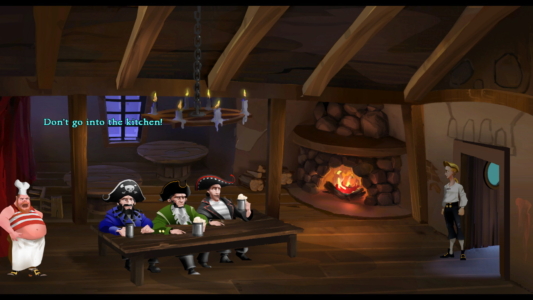
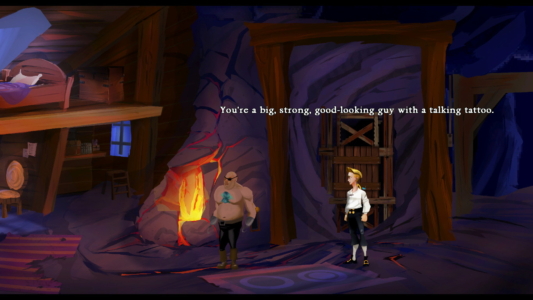
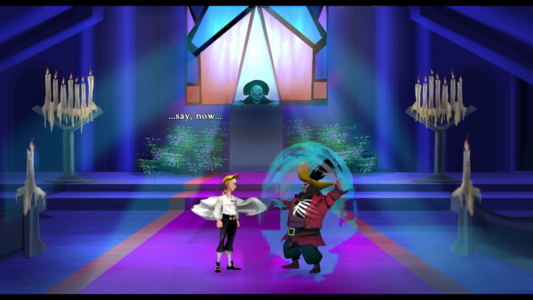
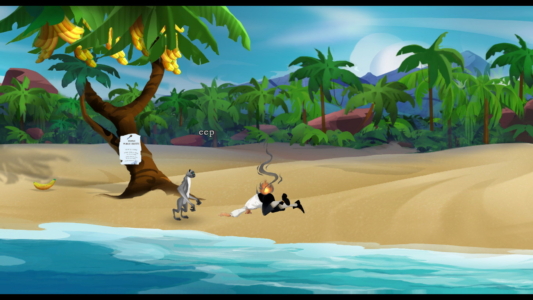
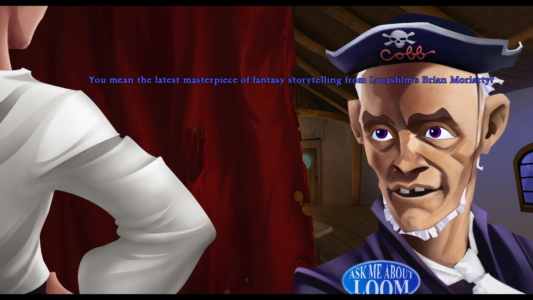

 Posts
Posts
As every author will tell you, writing dialogue in text or to be spoken is very different. Recording lines originally meant to be read only is therefore questionable at the very least.
August 19, 2020 @ 6:33 pm